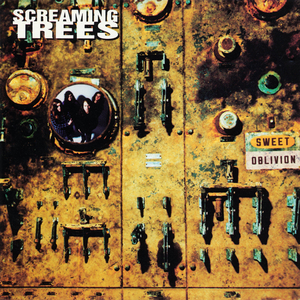Published on Mar 21, 2006
Screaming Trees (Mark Lanegan – vocals, Gary Lee
Conner – guitars, Van Conner – bass, Barrett Martin – drums) were
one of the many bands that emerged from the grunge scene seemingly
from nowhere. In reality, they had been a part of the Seattle music
scene for several years, releasing a number of albums and EPs.
Sweet Oblivion was their sixth full-length release in as
many years, and remains the high-water mark of their unfortunately
dodgy career, one marked by band member infighting and the
ubiquitous substance abuse problems. It’s a shame the guys couldn’t
keep their personal lives and creative juices focused tighter,
because it could have made them a household name.
While the Trees never broke away from the pack to find the kind of
runaway success some of their grunge era contemporaries did, they
still made a significant mark on the sound of the time. A big
reason they stood apart from many of their grunge peers was having
a more melodic (but no less murky) sound than the likes of Nirvana
and Soundgarden. Much of their sound feels rooted less in the punk
and metal ancestors many grunge bands embraced, and more firmly in
the psychedelic folk-rock of the late 60s-early 70s. Gary Lee
Conner’s loosely structured melodies and amorphous solos swirl and
wander in and out of the restrained but powerful rhythms of Martin
and brother Van.
Lanegan was also unlike most of the grunge era
singers both in sound and style. His deep, smoky voice is
reminiscent of Jim Morrison at times, and his laid-back drawl was
unlike most of the urgent and often nihilistic voices that came out
of that movement. Even at his most effusive, Lanegan’s voice wears
a cloak of weary resignation. This works perfectly on songs like
the “More Or Less,” with its melancholy chorus that drips with
finality and surrender; “Now that we’ve run this road so many times
/ Tonight it will not take us home / Gonna go to that deep river /
Where the water’s moving slow.”
The same emotion shapes the killer opening track
“Shadow Of The Season,” which became a minor hit for them. One of
their heavier numbers, driven by Martin’s powerful percussion,
Lanegan’s throaty shout cries for hope but belies a deeper dread of
loss; “Said Lord please give me what I need / He said there’s pain
and misery / Oh sweet oblivion feels alright.”
Most of the momentum for this release (what there was
of it) came from their most well-known song “Nearly Lost You,”
which made a big smash after its inclusion on the Singles
soundtrack and became a staple of radio and MTV for several months.
Despite the popularity of the track the album never took wings,
failing to even make gold record status.
It’s really a shame, because more exposure and a
quick follow-up album might have put them up in the hierarchy of
bands that took off from the first wave of the grunge explosion. On
top of that, dissension within the band, drugs and alcohol would
keep them out of the studio for four years, which successfully
killed any hope of riding the surge of popularity of the
Northwest-based grunge scene. By the time they came back in 1996
with Dust, no one cared. This band should have been an
important chapter in the grunge legacy, not just a footnote.
Regardless of its relative success or lack thereof,
Sweet Oblivion is an excellent listen and would probably
appeal to a lot of folks who didn’t care for the heavier grunge
bands. This is truly an overlooked gem from the era and should be
given its due as one of the best of the early grunge albums.
